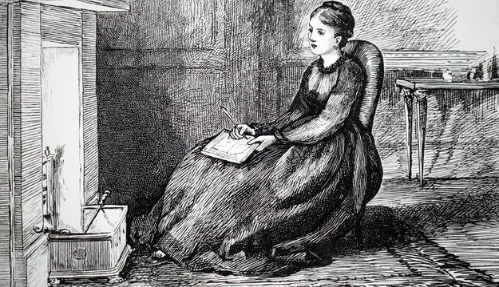Sunday Morning / June 9, 2023
The U.S. Supreme Court tweaked the Free Speech Clause of the First Amendment last week in a landmark win for online stalkers. Victims must now demonstrate predators have “an objective understanding and awareness of the threatening nature of their statements.”
The case chronicles thousands of Facebook posts from Billy Counterman to singer-songwriter Coles Whalen in 2010-2016. Colorado's Harassment By Stalking Law requires "proof beyond a reasonable doubt that a defendant's conduct would cause serious emotional distress to an alleged victim of stalking" but here’s the rub — it applies only to a reasonable person or objective standard of measurement. Counterman’s missives include: “Was that you in the White Jeep? What do you fear? You’re not being good for human relationships. Don’t need you. Die.”
Whalen, who found the messages “weird and creepy,” ignored the Facebook posts for nearly 6 years before reporting them to the police in 2016. Counterman was summarily convicted of stalking in Colorado; again on appeal in the 10th Circuit; and sentenced to 4 1/2 years in prison. Justice Monica M. Márquez writes for the court:
We hold that a true threat is a statement that, considered in context and under the totality of the circumstances, an intended or foreseeable recipient would reasonably perceive as a serious expression of intent to commit an act of unlawful violence.
In a 7-2 decision, the Supreme Court last week disagreed. Counterman's opinions, as such, freely expressed, including those admonishing Whalen to die, are fully protected by the Free Speech Clause of the First Amendment. Colorado would need to prove not that Whalen felt threatened, but that Counterman understood and shared the same objective understanding of a True Threat.
And just as Facebook's parent company went viral on Thursday with Threads: Meta Platform’s 500 character alternative to the exodus from Twitter. Meta reports 50 million downloads this morning; all of whom can connect to 4.9 billion social media users worldwide. While EU regulators “await clarification from regulators amid regulatory uncertainty about the service's use of personal data,” lets crosscheck a few facts on the victim's behalf.Freedom of Speech
In the United States, freedom of speech and expression is strongly protected from government restrictions by the Free Speech Clause of the First Amendment in the U.S. Constitution It begins:
Congress shall make no law respecting an establishment of religion, or prohibiting the free exercise thereof; or abridging the freedom of speech, or of the press; or the right of the people peaceably to assemble, and to petition the Government for a redress of grievances.
Speech, for context, in the British Colonies of North America was characteristically restrictive. The English criminal common law of seditious libel made criticizing the government a crime. Lord Chief Justice John Holt explained Great Britain’s rationale for the prohibition in rather simpleton terms: "For it is very necessary for all governments that the people should have a good opinion of it." Here are a couple of fun facts:

Coles Whalen 2016
In 1612, a Virginia governor declared the death penalty for a person that denied the Trinity; and in 1646 a Massachusetts law imprisoned all persons who denied the immortality of the soul. But when the New York Weekly Journal dared to criticize the governor of New York in 1735, it was Philadelphia lawyer Andrew Hamilton who argued that “truth should be a defense to the crime of seditious libel.” The jury agreed, ushering a trend toward tolerance, acceptance, and an assurance of free speech in Colonial America.Censorship Era
The Alien and Sedition Acts of 1798 were essentially 4 laws that enabled the U.S. Congress and executive to control the narrative amongst an influx of European immigrants. Alien Friends > Alien Enemies > and Naturalization all speak to the federal prowess to constrain rowdy foreigners. However, The Sedition Act makes it illegal to make false or malicious statements about the federal government. *Sidebar: The Act was used to expressly suppress speech critical of President John Adams administration, particularly the prosecution and conviction of many Jeffersonian newspaper owners that disagreed with the Federalist Party.
The Comstock Laws furthered suppressed the First Amendment if and when free speech ran afoul of Victorian morality throughout the 19th century. City and state governments monitored newspapers, books, theater, comedy acts, and films for offensive content and enforced laws with arrests, bans, impoundments and fines.
In particular, the Comstock Laws prohibited the U.S. Postal Service from delivering information about contraception; abortion; homosexuality; Indian affairs; women's rights; slavery; and racial segregation, healthcare, housing and education. Even personal letters between husbands and their wives were often censored and redacted upon delivery. The U.S. Office of Censorship led to the regulation of American film industry; Motion Picture Production Code; and McCarthyism.
In the twilight of the 20th century, the U.S. Supreme Court began returning to the founding father’s original baseline default rule of the First Amendment. Apart from certain narrow exceptions, the United States was not designed to regulate the content of speech. In 1971, Justice John Marshall Harlan II opined that the First Amendment operates to protect the inviolability of "a marketplace of ideas,” and Associate Justice Thurgood Marshall went further in Cohen v. California:
Above all else, the First Amendment means that government has no power to restrict expression because of its message, ideas, subject matter or content.A Few Exceptions
Incitement to lawless action, defamation of character, fraud, obscenity, child pornography, fighting words, and true threats are all considered general exceptions to the Free Speech Clause of the First Amendment today. While Section 230 renders all social media companies entirely blameless for their users content, it was last week’s Counterman v. Colorado that will now begin calibrating a person's state of mind into the equation of free speech and its consequences.

A rendering of Abigail Adams 1774
Yet part and parcel to having our say lies a general reply to someone else's way. Abigail Adams’ some 1,100 letters to her husband across a 50+ year marriage resonate in the very spirit of the nation's first principle.
Separated as they were by his extended trips to Philadelphia, France, Holland and Great Britain, she lived the vast majority of her married life alone, solemnly, in Quincy Massachusetts.
From her writing desk at Peacefield, the young bride waxed old and wise by corresponding with her statesman, Founding Father and later U.S. President by pen. “Is is true? Is it necessary? Is it kind?” she’d often reply, in a recurring thread to the Committee of Five. Sharing his concerns in each new station, her pen, in turn, would steer the nation.








